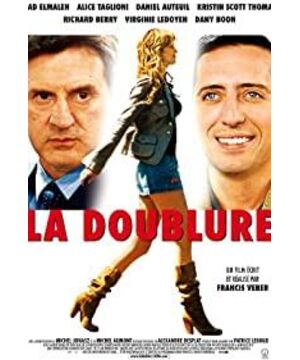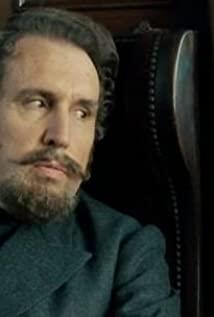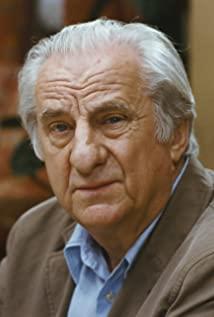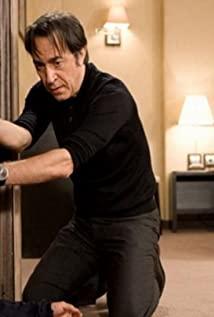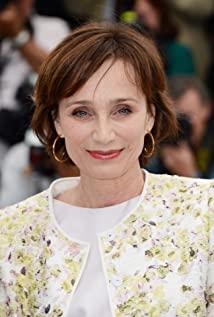Saying these words seems to have nothing to do with the movie "Alternatives", but this is the second French movie I watched that can trigger the third feeling mentioned above. The first is "Two Little No Guess". Of course, this is not a professional point of view, because I am not a professional at all. I just couldn't get out of it for a long time after watching this comedy romance and I had the opportunity to think about it. However, if I have to do it from a professional perspective, I can also analyze the fame of the two. Naturally, they cannot be the same as "Two".
"Substitute" takes love and comedy as the themes, and I also roughly sorted out the love relationship of "Substitute" in three lines. The first is a parking worker and a bookstore owner, the second is a model and a chaebol husband, and the third is naturally a chaebol husband and wife. To put it simply, it can be summed up as falling in love, getting married, and cheating. It can be described as everything. At the beginning of the film, the general relationship of these three lines is shown in a montage. A car parker’s career is equal to nothing, looks ordinary, and has no romantic talent and pursuit skills (at most 5.5). In pursuing a career that surpasses him a little bit, and looks a little bit better than him, he ends up in failure; a chaebol couple We had breakfast together, it seemed calm, but the undercurrents were actually surging. At least we didn’t realize that this was a couple when they came out (I thought it was the housekeeper and the proprietress when I watched it); the chaebol husband and the model lover had a tryst. , The relationship is complicated, mixed with love and money, and ended in a quarrel. In fact, if we go deeper, the director may actually metaphorize three classes in these three relationships. Parking workers and bookstore owners belong to the working class who are struggling for life, and models and chaebol husbands belong to those who are struggling for a thriving career. The middle class (because of the existence of powerful chaebol wives, let's look at it this way), and chaebol wives are naturally a superior bourgeoisie. The director hides three classes in the three relationships, and the three classes confuse the intricate love relationship. It is probably the use of this method to show us more intuitively the attitudes of the three characters towards love and money, which makes us feel Love is more warm, comedy is more intensified, or the audience is more diverse. Obviously, I think he achieved his goal, but I believe that whether it is the director’s deliberate guidance or we accidentally stepped on the banana peel, this structural arrangement should bring us more than that (discussed later).
There are two scenes that impressed me in this movie. The first is a scene where a parking worker stands outside the door of a bookstore waiting for the bookstore owner to get off work for an appointment. After buying the proposal ring, he was happily like a boy who had just won all the marbles of his playmates; standing outside the bookstore, he was as shy as a young girl in love. The restaurant carefully prepared for a date, nervously wandering outside the bookstore, panicking to guess the taste of this love chocolate. What is love? It is honey, Coptis chinensis, a gleaming but always looming shell on the beach, the sea that is sometimes turbulent and sometimes gentle, and it is A-Gump's life like chocolate in his mouth. Maybe you think I’m a little hypocritical to say this, but when I watched this scene, I also remembered the Xia Yu wandering under a quiet window in "Sunny Days" all day long, and in "Two Little No Guess" I found strangers in the library to practice confession. Marion Cotillard in the situation, and Jacques Behan, who looked at his first love when he returned from the middle of "Paradise Cinema", were equally tortured by the unpredictability of love.
The second is that the movie casually told us that the parking worker only asked the chaebol husband for 32,540 francs. In fact, this arrangement should be common in many movies, but every time it is performed, it can make sentimental people sad, because it expresses an idea: you are everything to me. So in this movie, the parking worker is the only person who remains pure in this materialistic society. Not the bookstore owner, because she didn't dare to look at her love directly; not a model, because she couldn't get rid of the bondage of money.
Having said so much, in fact, I didn't comment on the quality of this movie at all, only the feelings that this movie brought to me. If it is said that the film itself has no artistic value worth discussing. It doesn’t have the exquisiteness of Kirslovsky’s cheongsam like Maggie Cheung, or Luc Besson’s as swiftly as the Azure Dragon and Moon Knife, and it does not have the memory-filled sorrow and sadness of Tonadore’s movies. . There is also no trace of a commercial movie worth discussing, because not only does it lack the majesty of James Cameron, but even Zhang Yimou’s colorful red can't be achieved. The film is probably due to the limitation of the amount of money, and the only thing that can be called a big scene is Just count the scene in the model show (it's not worth mentioning in the big Chinese director). If you talk about the movie in detail, there are many points that are worth discussing. The movie itself is a little bit lagging in the grasp of the relationship between love and comedy. The weight of love and comedy is basically evenly divided between five and five, making the final parking worker and the bookstore. The boss’s transition from removing the barriers to the lovers eventually getting married was too hasty, lacked persuasiveness, and basically wasted the most moving ambush in the film. In addition, the plot of the film is not simple (but it is not vulgar, not to the point where the frogs and princes Cinderella such as "The Sparrow Becomes a Princess" and "Bodyguards"), and the depth of the characters is not enough, but I think Think, the whole film is less than 90 minutes, and it is a low-cost commercial film designed to amuse the audience. How can we ask for too much. If this film brings more meaning to the Chinese audience, then we can find that compared with most domestic commercial films, the quality of this film is not on the same level. The filmmakers behind this film The quality is not at the same level as the quality of domestic filmmakers. I really hope that some domestic bad movie filmmakers who only know how to collect money from the "stupid people, a lot of money, come quickly" film market can get some inspiration from this movie-it turns out that low-cost commercial movies can also be made like this!
However, the thoughts that this film sparked to us are what I admire the most. With regard to the intricate relationships and the vastly different attitudes towards love, the director seems to want to blame us, saying that bread is the capital of love, or that spiritual civilization is built on the basis of material civilization, but how much is this capital sufficient? ! Is it true that most of us when we are young and only have love left, in the name of saving money for love, we give up what we have, and go to the world alone, and then when we are in the middle age and have a career without love, we find that I have long lost a heart that can have love again, and in the end it was actually buying caskets and returning beads (just like Leslie Cheung, who was the number one martial artist in the "Evil East and West Poison" but was repenting when he was young and frivolous). What is love? It is floating clouds, scattered snow, and Nanke Yimeng who can't tell when it will arrive at midnight. It is only because it is pure and beautiful as illusory that it is precious.
Therefore, "Stand-in" is just a daydream from when I was young (seems like it's a bit late to point out). If you "free your mind" and let everyone have a passion, which man who has nothing in his twenties who has love doesn't dream of having two selves? One can use the warmth to warm up love, enjoy the greasy sweetness that love brings, and one who owns everything by oneself, can easily pay for the 32,540 francs that love pays; which one has everything except for the man who loves, don’t dream of having two Own? One can freely mediate in Vanity Fair, and it is right and wrong, and one can regain the heart that would be beaten by love when he was in his twenties. But everything is just a daydream. When the movie ends, when we wake up, those who should be on the go will always keep on running, the busy ones will always keep busy, and the ones that are missed will eventually be missed. But we always have to thank this movie, which not only brings us joy, but also provides us with a 90-minute daydreaming opportunity.
View more about The Valet reviews


